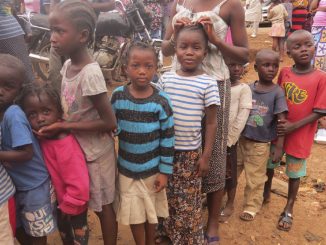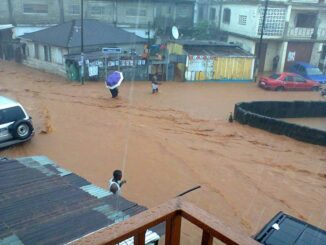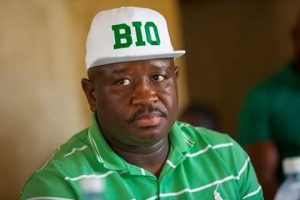Its official from the United Nations that Sierra Leone is the poorest nation in
the world. While academics, NGOs and international institutions mathematicize
this is Gross National Product, mortality and other ratios, we live with the
reality of hunger, diseases, squalor, unemployment and despair. Everybody,
even the unborn has now reached the chorus that corruption explains why Sierra Leone
is such terrible a place to live. Underpinning this chorus is an assertion that
the country is a huge recipient of international cash.In two articles in June
last year, in response to a London Times article on corruption in Sierra Leone
, I made key points.
While agreeing that corruption persists in the country, I made the point that
the level of noise about it draws purpose from various motivations. I argued
that civil society organizations and the media in Sierra Leone lack either the
intellectual preparedness or the energy to discuss corruption in any other
dimension beyond shouting “corruption borku.” Indeed shouting” corruption
borku” is a political instrument for some journalists and politicians, and a
cash machine for some civil society organizations. I argued in the
aforementioned articles that people from the West may be hollering corruption
as ploy to divert attention from their own contributions to our mess.Whether
people agree with these points or not, one thing the media and civil society
must not miss in this country is their role in engendering informed debate. It
seems that we are in fact missing that role. Listen to civil society leaders or
read our newspapers.
They are basically delivering “Poda Poda” conclusions with the only effort of
doing it in English. Whether we are discussing corruption, vice presidential
running mate, poverty, “donor korpoh”, we carry the same passion, analyses, and
conclusions from the “Poda podas,” to parliament, to newspapers to civil society
organizations, and UNDP reports to Kofi Annan. This brings me to the noise about
international assistance to Sierra Leone . The chorus is that Sierra Leone has
received huge monies from donors; which are being squandered or misused. The
argument goes that the bad state of our roads, the lack of electricity in the
big towns and cities, squalor and poverty does not show well the quantum of
money this country has received.
There are serious distortions veiled in the sum totals of monies that are often
quoted as assistance to Sierra Leone .
America for instance may have spent $1bn in Sierra Leone as international
assistance. Have we bothered to ask how much of that money went into budgetary
support for government? It is only money in government hands that government
has control over in terms of investment choices. America has its agencies that
spend her money here. And since the end of the war America ‘s money has been
spent on humanitarian assistance, governance strengthening and social
integration issues. So why are we looking for the roads, brand new generators
at Kingtom, adequate housing, and the like simply because America spent $1bn
here?The Chinese built stadium. Stadium is there. They built Magbass sugar cane
complex. Today Sierra Leone is exporting sugar. The Chinese built Dodo
Hydro-electric dam at Hanga. The Danish built the Bo power station. Bo and
Kenema have electricity. If Americans are spending on social integrations, then
let us look for social integration in accounting for American monies. And do we
even know that a big chunk of the sum totals of particularly American money is
‘monetized’ commodity assistance? These include army trucks and boots, tents,
bulgur, and oil.
Excepting EU direct budgetary support, and some DFID money and grants from World
Bank, the bulk of donor money in this country is not spent by the government.
And if those who spend their monies have chosen to do so on relief and
humanitarian issues why do we want to explain youth unemployment, ask of energy
pipe-borne water and proper housing in relation to “donor korpoh” Did we not see
how Government on her knees went out begging for $40m to complete Bumbuna? Where
was the willing donor or lender? Nowhere! And mark that the Special Court has
consumed that same amount of money in three years.In 2004 Clair Short, the
British Overseas Development Minister was here talking about British money and
corruption in Sierra Leone . The British in fact are daily patting their own
backs for their money in Sierra Leone . What money are we talking about?
£40million every year. £40million simply mean that per capital investment on a
population of five million translates into 50 pence per person per year.
Yes, Britain spends 50 pence on one Sierra Leonean per year. This is pure
comedy! And the 50 pence is derived on the assumption that all £40 million
pounds goes into government coffers. Mark the sorriest part: only part of the
£40 million goes into government hands. IMATT and other British projects use
the rest. This means that Britain is actually spending something like Le2,000
per Sierra Leonean per year for direct poverty reduction, or social service
related investment.
I do not seek to say that the investment choices being made by donors are
irrelevant. I simply want to say that the results that we look for in our
discussions of poverty, aid, and government must relate to the investment
choices made by those who hold the monies.
Britain for instance has emphasized recovery of governance institutions in its
assistance to Sierra Leone . Law enforcement capacity around the country, a new
army, the Anti-Corruption Commission, Law Reform Commission, Public Sector
Reform and such others stand testimony to such assistance.The pathologies of
Government however in respect of use of donor money are often explained in the
context of “development.” Humanitarian assistance is not development
assistance. In consultations for the 2004 Country Assistance Strategy of the
World Bank, Sierra Leoneans were unanimous in their emphasis on roads,
pipe-borne water, electricity, and housing among other things as constituting
their understanding of development assistance. Country-wide consultations in
preparation of the PRSP similarly captured this consensus. Sierra Leoneans from
all backgrounds never talked about those flamboyantly worded projects of the UN,
USAID, DFID, or EU on which millions of dollars have been spent. Donors are not
interested in those things that speedily fulcrum development in this country.
It is money borrowed by Government from international financial institutions in
the name of Sierra Leone that is building the highways, completing Bumbuna, and
expanding pipe-some water delivery in rural and urban towns among other core
development activities.And the disturbing and criminal thing is that it is
these same donors that are crying loudest Government’s failures in respect of
youth employment, proper housing, hospitals, roads, energy etc.




Leave a Reply